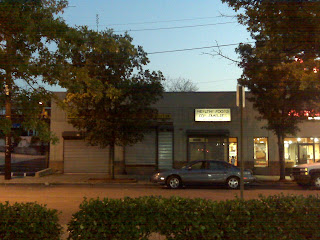
Saturday, September 6, 2008
Say Hey Ray!

Monday, September 1, 2008
Illegitimacy in the Ward
But I genuinely liked the neighborhood, many of the distinctly Deanwood homes, and the people who live here, many of whom are hard-working, lower middle class blue-collar workers. My sense was that the Deanwood was going to make a rebound in the years ahead. Two years later, I am still of that view. It is one of the reasons why I wanted to start writing about the area—to educate, to promote, and personally, to understand.
All neighborhoods are imperfect, whether it be the residents, events or circumstances that shape it (like crime or a bad economy), the scenery, or the amenities (or lack thereof), and it’s important to share the good and the bad. Its important to both describe the area’s promise and its failings, where it is growing and where it is still hurting.
To get a better read on how exactly how Deanwood is doing, I looked to Charles Murray for a basic framework. Murray, one of the foremost chroniclers of American welfare policy over the last three decades, points to three main indicators for tracking the underclass, by which he means those individuals who lack the basic building blocks of a society and experience extreme poverty, not just in their lack of resources but in their social relationships. His indicators are 1) criminality, 2) male dropouts from the labor force, and 3) illegitimate births. My hope is to look at each one at a time in the weeks ahead. For now, let’s take a look at that last indicator—the number of illegitimate births.
Murray writes in The Underclass Revisited:
When a large proportion of the children in a given community grows up without fathers, the next generation, especially the young males in the next generation, tends to grow up unsocialized—unready to take on the responsibilities of work and family; often criminal, often violent. The effects of absent fathers are compounded by the correlations of illegitimacy with intellectual, emotional, and financial deficits among the mothers—deficits that in turn show correlations with bad parenting practices.
From this vantage report, Ward 7 is clearly struggling. According to the D.C. Department of Health, in 2004 (the most recent available year), 82.6% of births were illegitimate—more than 8 out of 10 babies born out of wedlock. This is compared with D.C.’s overall illegitimacy ratio of 56% and 35% nationally (2003 figure).
Is the illegitimacy ratio improving? Maybe. In 2000, while the D.C. ratio was 60.3% and the national ratio was 33.2%, the Ward 7 ratio was 83.3%. With national illegitimacy slightly on the rise, it has actually dropped 7% in the District, but only by 0.7% in Ward 7, which may or may not be statistically significant. It appears that Ward 7 is either not or has yet to benefit from the same trends in the number of illegitimate births. Perhaps there is silver lining in the fact that these numbers seem to be crawling in the right direction, but it is hard to get particularly excited about what these numbers suggest about the next generation of youth who are currently growing up in Deanwood. Murray writes further:
If 80-90 percent of the children in a neighborhood are born to unmarried women…then young boys grow up with only one visible example of what it means to be a grown-up male—the bad one. The social problem represented by illegitimacy[becomes] a crisis.
Ward 7 is in the midst of such a crisis, and we need to be talking a whole lot more about promoting marriage and abstinence in our schools. We need to use every opportunity to affirm our young women’s desire to have children but encourage them to do so within the context of marriage first. We need to be encouraging our young men to prize marriage themselves, to care enough about their girlfriends to wait for it, and then to be hard-working providers for their families for life. Marriage and abstinence work, and any politician, civic leader, or educator who fail to see that are simply not worthy of serving the ward.
I hope to have more later on actual policy proposals. However, in the meantime, since we’re now a little more than a week away from local elections, how about asking each candidate how they intend to promote marriage and abstinence, if elected? How about asking the incumbent, Yvette Alexander, what she has done to deal with illegitimacy in her time in office? The responses would likely show who has thought deeply about the fundamental issues affecting neighborhoods like Deanwood in Ward 7, and who is prepared to lead.